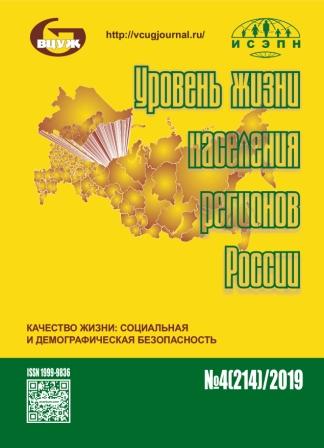Финансово грамотное поведение россиян: факторы формирования
Для цитирования
Аликперова Н. В., Виноградова К. В. Финансово грамотное поведение россиян: факторы формирования // Уровень жизни населения регионов России. 2019. Том 15. № 4. С. 54-69. DOI: https://doi.org/10.19181/1999-9836-2019-10082
Аннотация
Объект. Финансово грамотное поведение.Предмет. Факторы формирования финансово грамотного поведения.Цель. Выявление факторов, влияющих на формирование финансово грамотного поведения на основе результатов эмпирических исследований уровня финансовой грамотности населения России, результатов экспертного опроса в рамках НИР «Институционализация финансовой грамотности населения России».Основные положения статьи. Формирование финансово грамотного поведения является не только предпосылкой для эффективного функционирования и развития всей финансовой системы России, но и выступает фактором материального благополучия граждан, сглаживающим элементом дифференциации в доходах.Изменения в экономических отношениях, усложнение финансового рынка, его структуры и продуктов, а также переход на цифровые рельсы привели население к необходимости вырабатывать навыки формирования финансово грамотных стратегий. Для реализации таких стратегий необходимо наличие ресурсной и интеллектуальной базы у населения, а также возможностей для формирования эффективной экосистемы взаимодействия всех участников финансовых отношений. В ходе проведённого исследования были выявлены основные тенденции в финансовом поведении россиян в современных условиях, факторы, влияющие на выбор тех или иных стратегий финансового поведения, а также условия для трансформации данных стратегий в новые формы финансово грамотного поведения. Среди основных можно отметить низкий уровень финансовой грамотности россиян, причём данная тенденция прослеживается из года в год, что обусловлено не только психологическими и культурными аспектами поведения (присущие россиянам страх, неопределённость и неуверенность в завтрашнем дне, ленность, стереотипность мышления, а также перекладывание ответственности на третьих лиц), но и усложнением финансового рынка в целом, ошибочным представлением сути тех или иных понятий и, как следствие, выстраивание финансовых стратегий в соответствии с этим пониманием, распространением набирающего оборота феномена – мисселинга, а также может косвенно свидетельствовать о малоэффективности действующей системы повышения финансовой грамотности россиян. Согласно анализу вторичных данных, данных государственной статистики доверие населения к финансовым институтам, уровень доходов также влияют на формирование финансово грамотных стратегий, что подтверждают и данные экспертного опроса, проведённого в рамках НИР «Институционализация финансовой грамотности населения России».
Ключевые слова:
финансово грамотное поведение, финансовое поведение населения, финансовая грамотность, население, доходы, финансовый рынок
Литература
Аликперова Н.В. Финансовые стратегии россиян: риски и барьеры // Народонаселение. 2019. № 2. (120-132).
Акерлоф Дж. Поведенческая макроэкономика и макроэкономическое поведение. // Мировая экономическая мысль. Сквозь призму веков. В 5 томах. Т.5. Кн.2. М.: Мысль, 2005. (444-483).
Дьюзенберри Дж. Доход, сбережения и теория потребительского поведения. Нью-Йорк: Издательство Оксфордского Университета, 2015. (128).
Зелизер В. Создание множественных денег // Экономическая социология. 2002. Т. 3. №4 (Сентябрь). www.ecsoc.msses.ru. (58-72).
Канеман Д. Думай медленно, решай быстро. М.: АСТ, 2014. (653).
Кейнс Дж. Общая теория занятости, процента и денег // Кейнс Дж. Избранные произведения. М.: Экономика, 1993. (260-329).
Модильяни Ф. Жизненный цикл, личные сбережения и богатство нации // Мировая экономическая мысль. Сквозь призму веков. В 5 томах. Т.5. Кн.1. М.: Мысль, 2004. (529-560).
Шиллер Р., Акерлоф Дж. Spiritus Animalis: или Как человеческая психология управляет экономикой и почему это важно для мирового капитализма. / Пер. с англ. Д. Прияткина; под науч. ред. А. Суворова; вступ. ст. С. Гуриева. М.: ООО «Юнайтед Пресс», 2010. (273).
Arrondel L., Debbich M., Savignac F. Financial Literacy and Financial Planning in France. Numeracy, 2013, Vol. 6, Iss. 2, Article 8.
Banking Policy and the Price Level, by D.H.Robertson (P.S.King & Son, Ltd, 1926), p.103.
Lusardi A., Mitchell O.S. Financial Literacy and Retirement Preparedness: Evidence and Implications for Financial Education Programs. Business Economics, January 2007, pp.35-44.
Mitchell O.S., Lusardi A. Financial Literacy and Economic Outcomes: Evidence and Policy Implications. GFLEC Working Paper 2015-1, January 7, 2015.
Muth John F. «Rational Expectations and the Theory of Price Movements» Source: Econometrica, Vol. 29, No. 3 (Jul., 1961), pp. 315-335 https://www.fep.up.pt/docentes/pcosme/S-E-1/Eco-29-3-315.pdf
To Spend or to Save? In Katona, G. Psychological economics. New York: Elsevier, 1975.
Vroey M. De and Malgrange P. The History of Macroeconomics from Keynes’s General Theory to the Present https://sites.uclouvain.be/econ/DP/IRES/2011028.pdf
Акерлоф Дж. Поведенческая макроэкономика и макроэкономическое поведение. // Мировая экономическая мысль. Сквозь призму веков. В 5 томах. Т.5. Кн.2. М.: Мысль, 2005. (444-483).
Дьюзенберри Дж. Доход, сбережения и теория потребительского поведения. Нью-Йорк: Издательство Оксфордского Университета, 2015. (128).
Зелизер В. Создание множественных денег // Экономическая социология. 2002. Т. 3. №4 (Сентябрь). www.ecsoc.msses.ru. (58-72).
Канеман Д. Думай медленно, решай быстро. М.: АСТ, 2014. (653).
Кейнс Дж. Общая теория занятости, процента и денег // Кейнс Дж. Избранные произведения. М.: Экономика, 1993. (260-329).
Модильяни Ф. Жизненный цикл, личные сбережения и богатство нации // Мировая экономическая мысль. Сквозь призму веков. В 5 томах. Т.5. Кн.1. М.: Мысль, 2004. (529-560).
Шиллер Р., Акерлоф Дж. Spiritus Animalis: или Как человеческая психология управляет экономикой и почему это важно для мирового капитализма. / Пер. с англ. Д. Прияткина; под науч. ред. А. Суворова; вступ. ст. С. Гуриева. М.: ООО «Юнайтед Пресс», 2010. (273).
Arrondel L., Debbich M., Savignac F. Financial Literacy and Financial Planning in France. Numeracy, 2013, Vol. 6, Iss. 2, Article 8.
Banking Policy and the Price Level, by D.H.Robertson (P.S.King & Son, Ltd, 1926), p.103.
Lusardi A., Mitchell O.S. Financial Literacy and Retirement Preparedness: Evidence and Implications for Financial Education Programs. Business Economics, January 2007, pp.35-44.
Mitchell O.S., Lusardi A. Financial Literacy and Economic Outcomes: Evidence and Policy Implications. GFLEC Working Paper 2015-1, January 7, 2015.
Muth John F. «Rational Expectations and the Theory of Price Movements» Source: Econometrica, Vol. 29, No. 3 (Jul., 1961), pp. 315-335 https://www.fep.up.pt/docentes/pcosme/S-E-1/Eco-29-3-315.pdf
To Spend or to Save? In Katona, G. Psychological economics. New York: Elsevier, 1975.
Vroey M. De and Malgrange P. The History of Macroeconomics from Keynes’s General Theory to the Present https://sites.uclouvain.be/econ/DP/IRES/2011028.pdf
Форматы цитирования
Другие форматы цитирования:
APA
Аликперова, Н. В., & Виноградова, К. В. (2019). Финансово грамотное поведение россиян: факторы формирования. Уровень жизни населения регионов России, 15(4), 54-69. https://doi.org/10.19181/1999-9836-2019-10082
Раздел
ЭКОНОМИЧЕСКИЕ ИССЛЕДОВАНИЯ








